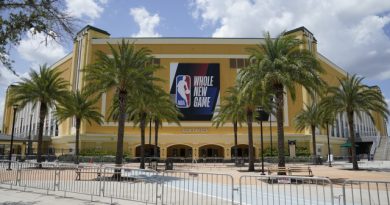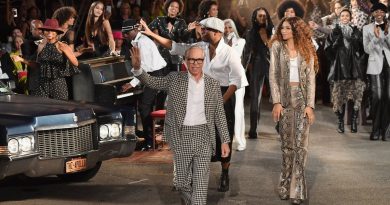How Bad Will the US Luxury Slowdown Be?
High energy prices and inflation, geo-political turmoil and the tightening of monetary policy have taken their toll on consumer sentiment, dampening the “YOLO” attitude that drove unprecedented growth for luxury fashion brands since the pandemic.
But after slumping last year, shares in most listed luxury groups are now trading around multi-year-highs, suggesting that investors are increasingly confident that demand for high-end products will defy the general gloom.
To be sure, improved valuations are mostly being driven by hopes for a rapid rebound in Chinese spending following the lifting of strict anti-coronavirus measures. But the rosier outlook is also informed by a growing sense that in spite of macroeconomic gloom and a financial panic, the slowdown in the US market — luxury’s growth engine since the pandemic — may be less severe than expected, and relatively short-lived.
Even amid interest rate hikes, layoffs and a banking panic sparked by the collapse of two regional banks in March (Silicon Valley and Signature), the US market is expected to grow 7 percent this year, analysts at HSBC said. Bernstein expects sales to American clients to grow between 5 and 7 percent — a sharp slowdown compared to the last two years, but far from a collapse.
American luxury sales have exploded since the pandemic, rising 35 percent over 2019 levels to reach €113 billion last year, according to consultancy Bain. Last year alone luxury brands’ sales rose 25 percent in the region even as a deteriorating economic picture pounded the stock and housing markets.
But cracks finally started to show in November, with sales of entry-level luxury products slowing sharply in the holiday season. The US market is “taking a breather,” Gucci- and Saint Laurent-owner Kering’s chief financial officer Jean-Marc Duplaix said in a February press conference. “Aspirational clients in particular are sort-of taking a break.”
Growth slowed more sharply from the start of the year, dropping to a low single-digit rate, market sources and analysts estimate. Credit and debit card data from Mastercard showed a 4 percent year-on-year increase in apparel spending for February, with consumers putting an “emphasis on pricing and value” in their choice of retailer, the payments company said.
Still, luxury brands are determined to hold onto the flood of new customers they’ve attracted since the pandemic — a breakthrough in a market where fashion buyers have long been hooked on discounts, and even wealthy households tend to prioritise other categories like houses and cars (not to mention experiences like restaurants and travel).
Brands have been staging big-budget marketing events like Versace’s March show in Los Angeles, accelerating the pace of targeted clienteling initiatives like dinners with celebrity guests and couture pop-ups in places like Napa Valley and the Hamptons.
And, even as growth slows, brands have forged ahead with plans to roll out new stores in fast-growing second- and third-tier cities, where pockets of wealthy consumers have long been overlooked, and whose expansion has accelerated since the pandemic. Think Hermès in Naples, Florida; or Saint Laurent in Charlotte, North Carolina.
“Brands are not pulling back on their plans [for store openings],” New York-based luxury consultant Robert Burke said. “We’re able to gather more data than ever about local markets, and realised the strength of cities like Denver, Colorado or Nashville, Tennessee. There’s a pocket of customers in these cities that just love to shop.”
“The growth in cities like Nashville or Charlotte, it’s structural. It’s not going to disappear,” Kering CEO François-Henri Pinault said.
Refurbished and expanded stores in the most visible shopping capitals are also underway: Tiffany’s “Landmark” project — a complete overhaul of its iconic flagship store on 5th Avenue — is set to open in May. Valentino is set to open an expanded Madison Avenue location later this year.
Analysts expect that store openings, as well as revamped collections, will help to re-energise sales, with growth picking back up (albeit at a more modest pace) from the second half of the year. The industry will also face easier comparisons as it annualises Americans’ rebound in travel, which conspired with a strong dollar to drive a sharp increase in tax-free shopping in Europe in the second half of last year (to the detriment of US stores).
“There’s been an exodus of wealthy shoppers to Europe and you’re following two years of exuberance,” HSBC analyst Erwan Rambourg said. “Right now we see the US demand for luxury as being in a bit of an air pocket, but we think it’ll pick back up.”
An aesthetic shift toward more timeless, elevated styles could also help brands keep growing in the US: attracting more mature clients who weren’t as interested in luxury’s recent logomania, and who are more likely to be insulated from inflation and layoffs. “Timeless luxury is very relevant right now,” Burke said.
But that same aesthetic shift could also ratchet up the pressure on luxury’s aspirational customers: many lower-income consumers and HENRYs (High Earners Not Rich Yet) who splurged on $900 sneakers in recent years would balk at paying $4,000 for a suit. More some, keeping up with changing tastes may require trading down to less expensive brands.
Still, “luxury goods are seen to be addictive: the boost in self-esteem they provide is hard to give up,” Bernstein analyst Luca Solca wrote in a recent note to clients. “The expectation is that European and US consumers will prove sticky and won’t give up on buying luxury goods products.”
THE NEWS IN BRIEF
FASHION, BUSINESS AND THE ECONOMY
:quality(70)/cloudfront-eu-central-1.images.arcpublishing.com/businessoffashion/JZQA5MK7NRET3D5IBMQVC3JXAM.jpg)
Luxury boom makes Richemont, Burberry key European M&A targets. With sales of luxury goods widely expected to withstand the darkening economic outlook and Chinese demand enjoying a post-Covid reopening boost, the sector appears ripe for a mergers and acquisitions wave, according to an informal Bloomberg survey of 17 M&A desks, fund managers and analysts.
H&M posts surprise Q1 profit as cost-cutting bears fruit. Operating profit in the Swedish group’s fiscal first quarter was 725 million Swedish crowns ($69.73 million) against a profit of 458 million crowns a year earlier and a mean forecast of 1.10 billion loss in a Refinitiv poll of analysts.
Lululemon sees 2023 sales, and profit above estimates on steady demand. Lululemon Athletica Inc forecast annual sales and profit above Wall Street estimates on Tuesday, betting that demand for its pricier yoga wear and athleisure clothing would hold strong even as inflation drags consumer spending.
Nike faces shareholder proposal on human rights. In a shareholder proposal released Thursday, London-based Tulipshare requested a report from Nike on whether its policies effectively address its stated equity goals and human rights commitments.
Patek Philippe looks beyond Nautilus with a new prototype. Patek Philippe SA will soon introduce a new model line for the first time in nearly a quarter century, a fresh offering that the head of the family-owned Swiss watchmaker expects could one day compete with its most desirable timepieces.
Next dials down inflation estimates. Next Plc shares plunged as the UK retailer warned of a challenging year ahead and repeated profit and sales will probably decline this year.
Prada aims to hire over 400 workers in Italy this year. Prada aims to hire more than 400 people in Italy by the end of the year to strengthen its production capacity and maintain growth, the Italian luxury group said on Thursday.
Burberry acquires Italian technical outerwear supplier. Burberry is paying €21 million to acquire a business unit from long standing supplier Pattern, allowing the company to bring product development for technical outerwear in-house.
Nordstrom, Dillard’s garment suppliers in violation of wage laws in California. Southern California’s garment factories are facing scrutiny for underpaying workers who make clothing for some of the nation’s top retailers.
Report: Adidas, Beyoncé end ‘Ivy Park’ partnership. Adidas AG and pop star Beyoncé have reportedly ended their partnership following disappointing sales, just as the German sportswear maker struggles with the fallout of the collapse of its Yeezy shoe alliance.
Adidas retracts opposition to Black Lives Matter three-stripe design. Sportswear maker Adidas AG on Wednesday reversed course 48 hours after asking the US Trademark Office to reject a Black Lives Matter application for a trademark featuring three parallel stripes.
J.Crew lays off 3 percent of its workforce. The American retailer confirmed Tuesday that it has eliminated less than 3 percent of its corporate headcount as part of reorganisation efforts.
Walmart faces second US lawsuit this week over treatment of workers. Walmart Inc was sued on Thursday by the US Equal Employment Opportunity Commission (EEOC), the agency’s second lawsuit this week accusing the US’ largest retailer of discrimination against workers with disabilities.
Next agrees to buy Cath Kidston out of administration. Next Plc has agreed to buy fashion and homeware brand Cath Kidston after the chain collapsed into administration in another casualty of Britain’s cost-of-living crisis.
US brand management firm Bluestar Alliance buys Scotch & Soda label. Bluestar Alliance, a US brand management company, said on Monday it has acquired the Scotch & Soda clothing brand from its Dutch owner for an undisclosed sum.
Union group calls on brands to support garment workers after Turkey quake. The Pay Your Workers coalition said international brands should commit to pay suppliers on time, take steps to address wage theft and make sure factories don’t reopen until they are safe.
Target announces Spring designer collaborations. Target has tapped Agua Bendita, a Colombian label known for its bold floral prints, Fe Noel, a Brooklyn-born brand with Grenadian roots, and Los Angeles-based Rhode, which is synonymous with printed dresses, as its latest designer collaboration partners.
THE BUSINESS OF BEAUTY
:quality(70)/cloudfront-eu-central-1.images.arcpublishing.com/businessoffashion/YASA2RA2TVEMZCY4RMZESSRFMA.jpg)
Bankrupt Morphe owner acquired by lenders for $690 million. Forma Brands, the bankrupt owner of the Morphe makeup brand, reached an agreement with lenders Jefferies Finance LLC and Cerberus Capital Management to be acquired in exchange for $690 million in debt relief, according to a court filing.
Brazilian beauty giant Natura proposes a 32 percent cut to management pay. Brazilian cosmetics maker Natura & Co is seeking to cut executive pay by 32 percent as part of an overhaul aimed at restoring investor trust.
PEOPLE
:quality(70)/cloudfront-eu-central-1.images.arcpublishing.com/businessoffashion/JWBIBMC7VJB5VAX3HYFJSZIEUE.jpg)
Roberto Cavalli names CEO. Sergio Azzolari is joining Roberto Cavalli as its new CEO, effective April 2, the Italian brand said Thursday. The CEO of DSquared since 2017, Azzolari previously held roles at Tod’s, Luxottica, and Missoni.
Macy’s to replace turnaround CEO next year. Macy’s Inc chief executive officer Jeff Gennette will retire next year after four decades with the US department store chain, the company said on Wednesday, naming Tony Spring as his successor.
MEDIA AND TECHNOLOGY
:quality(70)/cloudfront-eu-central-1.images.arcpublishing.com/businessoffashion/IUT2KSMDXBAETIYVBHWNXXUPNI.jpg)
US House Speaker says lawmakers to move forward with TikTok bill. House of Representatives speaker Kevin McCarthy said on Sunday lawmakers will move forward with legislation to address national security worries about TikTok.
Alibaba considers yielding control of some businesses in overhaul. Group CEO Daniel Zhang said the company’s breakup into separate businesses will allow its units to become more agile and eventually launch their own initial public offerings.
Compiled by Sarah Elson.



